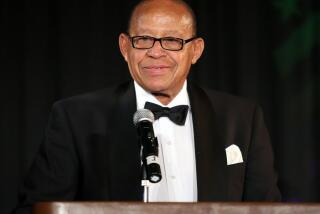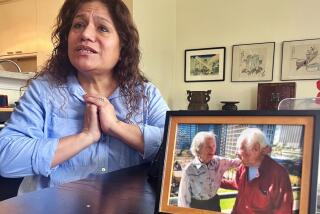The News According to Fred Friendly
- Share via
“60 Minutes” correspondent Andy Rooney has worked at CBS since 1959, primarily as a writer and producer for CBS News. He worked under Fred Friendly when Friendly was president of CBS News from 1964 to 1966. Rooney also writes a twice-weekly column for 200 newspapers and is the author of 11 books.
If mankind had not needed something better than a candle to illuminate its work, Thomas Edison might never have become world-renowned for inventing the light bulb. The world has to need what a genius can do or the genius may live out his life in obscurity.
Fred W. Friendly, who died this week at age 82, came along at the right time. Television was just beginning to be a factor in the life of the people of this country in 1950, and television needed news. Fred Friendly either knew how to do broadcast news or figured out how. He laid out the ground rules for broadcast journalism and established the standards to which its best practitioners still aspire.
Over the 40 years of his career, Fred’s restless brain searched out the most pressing and complex questions puzzling thoughtful citizens and confronted them directly in the programs he produced. He loved dilemmas. The subjects of his broadcasts included such topics as national security in wartime versus freedom of the press to report; the right, or absence of the right, of public figures to live private lives; school prayer; the right to live, the right to die; affirmative action, yes or no; the federal government versus the states; journalism’s use and abuse of anonymous sources; the 1st Amendment and the right to free speech, including offensive hate speech.
Fred Friendly was my friend and my boss at CBS. He was my boss by dint of his extraordinary intellect, his ability to accomplish things and his talent for directing others toward the end of attaining the goals he established.
He was my friend because we met years before he knew Edward R. Murrow, whose fame and reputation he helped make, and our relationship never ended until Wednesday.
In 1945, Fred was a roving correspondent, a sergeant in the China-Burma-India theater in World War II, reporting for the GI newspaper the CBI Roundup. I held the same job in the European theater with the Army daily, the Stars and Stripes.
A former staff member of the Los Angeles Times, Fred Eldridge, then a colonel in the Army, was transferred from the CBI to the Stars and Stripes in Paris. He decided it would be a good idea if I went to the CBI and reported back to the soldiers in Europe what life was like there. It was assumed, before The Bomb was dropped, that the soldiers in Europe would be sent there to invade Japan.
Eldridge simultaneously decided that Fred Friendly should move from New Delhi to Paris. Fred and I swapped places and met in Paris after he arrived and before I left. Our time together was brief, but under those circumstances, it was enough to bond a friendship that lasted a lifetime.
In deference to the traditions of eulogy in obituary writing, I will withhold details of how difficult Fred Friendly was to work for. He was a brilliant tyrant who demanded better than everyone’s best and would brook not the slightest deviation from his ideal of journalistic ethics.
Fred suffered his last stroke eight months ago. He was never Fred Friendly again. He would not have wanted to exist without his great brain, but he wasn’t there to make the decision. His brain had gone to that never-never land of no return where brains of stroke victims often go.
It was too difficult for me to go to see him in his last weeks. Too sad. Cowardly, perhaps. He was barely conscious, and the sadness of it was multiplied by flashes of cognition that made you think he might have been trying to awaken from a nightmare and could not. Someone directly asked his wife, Ruth, if she’d rather have him this way or not at all. She said she’d rather have him. A little bit of Fred was better than nothing.
On my last visit, Ruth and I sat next to him on the edge of the bed. I was thinking he didn’t sense anything and I wanted to leave. Then Fred’s eyes fluttered open and he reached out to grope for Ruth’s loving hand. He knew something still, I thought to myself. He knew he loved Ruth.
I hope he knew I was there.
More to Read
The complete guide to home viewing
Get Screen Gab for everything about the TV shows and streaming movies everyone’s talking about.
You may occasionally receive promotional content from the Los Angeles Times.






